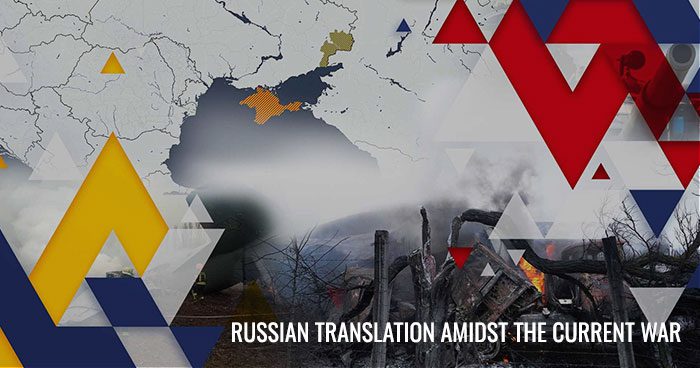Well, I am sure that everyone by now knows or has heard about this current war between Russia and Ukraine which has been going on for months now. The purpose of this article is not to take side in this conflict but to investigate how this war affects Russian translation requests that we get from customers and how it affects the relationship between translation companies and their Russian clients as well as the relationship between translation companies and the customers who request Russian translations but are not necessarily Russian themselves. This is a very touchy subject for us because we have an abundance of Russian clients and of clients that are not necessarily Russians but request Russian translation services on behalf of their clients. When these requests for translation services come in, we do not normally discuss anything about the war with our clients. But they always recall what is going on in Ukraine whether we like it or not.
Well, you might say, how does that affect the translation of Russian documents exactly, or how does it affect an onsite interpretation request or even a remote interpretation request or one via Zoom or MS Teams? It does not really affect it since the translator working on the document cannot lie or provide falsehood on the translated document; the Russian or Ukrainian interpreter working on an onsite or remote assignment would also be a professional linguist and would certainly not allow any possible bias to take shape in their performance. It only recalls what is going on there each time a request is made in either of these languages. If you are not familiar with our business, the process goes like this: 1) The request comes in, 2) we collect as much information as we can from the requester, 3) the request is then forwarded to the linguist who will be working on the document in the case of a translation, or the interpreter in the case of an interpretation request. Some of our Russian and Ukrainian linguists have shared the same sentiments with us concerning this situation. They have not necessarily discussed the war with us, they simply expressed their disapproval of it.
Now, when it comes to mind, it comes to mind for us only when these requests are made and then some of us find ourselves thinking of what’s going on in Ukraine. For me, I may do a quick search for the news on the Internet, to see the latest news coming from Ukraine. I’ve discussed this situation with several of my colleagues at work and with other translation companies, and they have expressed the same sentiments and reactions. To demonstrate this situation further, let’s say an attorney for example who may or may not be Russian makes a request for translation services from Russian to English or English to Russian, or we can also assume that the client who is Russian, makes the request himself instead of the attorney. In either situation, the fact that it is a request for Russian translation services, or Ukrainian translation services for that matter, it brings this whole saga in mind whether we like it or not.
Regardless of one’s stand about this war, we can all admit that it is nothing short of a tragedy. In relation to its effect on to the translation industry, it is subtle but palpable. It is not easy to fully explain its full effect on the industry, but I believe that our readers get the picture. Finally, it is important to emphasize that we are not in the news business or diplomacy business; we are simply a translation company that provides all sorts of languages services here in the United States and aboard, but mainly here in the US. Russian and Ukrainian translations happen to be among these services.

